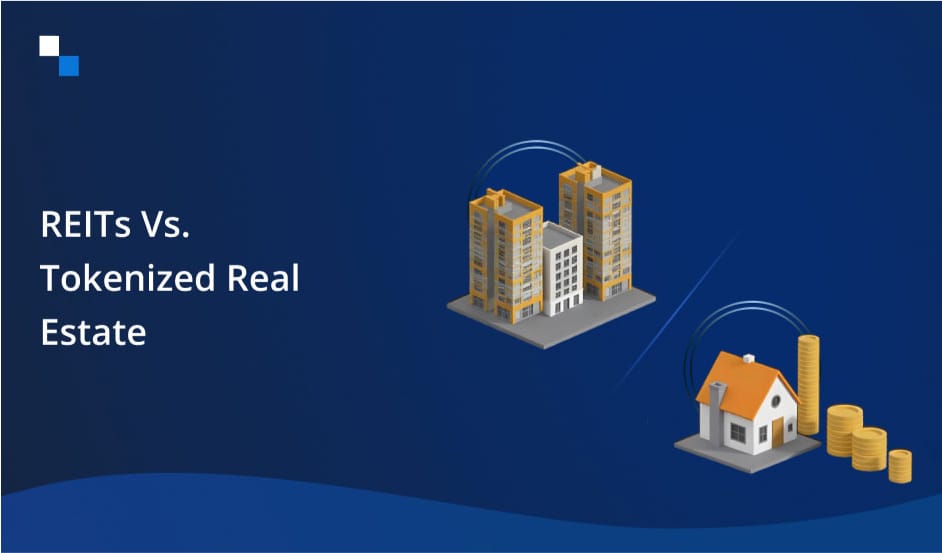The world of real estate investment has long been dominated by traditional investment vehicles, with Real Estate Investment Trusts (REITs) being one of the most popular methods for accessing real estate markets. However, real estate tokenization, powered by blockchain technology, is gaining momentum as a revolutionary alternative that promises to reshape how investors approach property investment. But how does real estate tokenization compare to traditional REITs when it comes to potential returns?
In this blog, we’ll explore the key differences between these two investment vehicles and explain why real estate tokenization might offer superior returns for investors, especially when considering the evolving landscape of asset management.

What is Real Estate Tokenization?
Real Estate tokenization is the process of digitizing real estate assets into blockchain-based tokens that represent ownership stakes in those assets. These tokens can be traded, sold, or transferred among investors, offering a level of liquidity, flexibility, and fractional ownership that traditional real estate investment vehicles simply cannot match.
By leveraging blockchain technology, tokenization offers unparalleled transparency, security, and efficiency, ensuring that all transactions are recorded on an immutable ledger. This innovation has made real estate more accessible to a broader range of investors, reducing barriers such as high capital requirements and geographic limitations.
What Are Traditional REITs?
Real Estate Investment Trusts (REITs) are companies that own, operate, or finance income-producing real estate. They pool funds from multiple investors to invest in a diversified portfolio of properties, such as office buildings, apartments, and retail centers. REITs typically distribute a significant portion of their income as dividends to investors, offering an attractive income stream.
REITs are either publicly traded on stock exchanges or privately held. Public REITs are traded on major exchanges like the New York Stock Exchange (NYSE), offering investors liquidity, though they are still subject to market fluctuations and can be vulnerable to stock market volatility.
Liquidity and Flexibility: Real Estate Tokenization Leads the Way
Real Estate Tokenization: One of the primary advantages of real estate tokenization over REITs is its liquidity. Traditional real estate investment requires a significant commitment, with investors typically needing to wait years before selling their property or receiving capital returns. Tokenized real estate, on the other hand, allows investors to trade their fractional ownership in real-time on blockchain-based platforms, unlocking liquidity that was once impossible for real estate investors.
Because the ownership is divided into digital tokens, these assets are far more easily transferable, allowing investors to buy, sell, and trade their stakes at any time. Tokenization enables you to liquidate your investments almost instantly, providing flexibility that traditional REITs and real estate investments simply can’t match.
Traditional REITs: While REITs are also liquid in the sense that they can be traded on stock exchanges, they still operate within a traditional stock market framework. Investors can only trade during market hours, and they are exposed to stock market fluctuations and general volatility. Furthermore, REITs can’t guarantee immediate access to your capital, especially during market downturns, where liquidity might dry up or the value of the REIT shares can decline significantly.
Accessibility: Real Estate Tokenization Opens Doors for Global Investors
Real Estate Tokenization: Tokenized real estate offers global access to property markets that were previously closed to a large segment of investors. With tokenization, an investor from anywhere in the world can purchase fractional ownership in real estate assets, bypassing geographic restrictions, exchange limitations, or exorbitant fees.
For instance, investors can own a piece of a commercial property in New York or a luxury apartment complex in Dubai without the need for complicated paperwork or lengthy waiting times. The entry barriers are also significantly lower than traditional real estate, allowing small investors to participate in high-value properties through fractional ownership.
Traditional REITs: While REITs are generally accessible to global investors, the investment process can still be convoluted for international buyers due to varying tax laws, currency conversion fees, and regulatory hurdles. Additionally, REITs are usually limited by national borders and may not provide exposure to international real estate markets, especially emerging markets that can offer higher returns.
Fractional Ownership: Unlocking High-Value Properties
Real Estate Tokenization: One of the most significant advantages of real estate tokenization is the ability to break down large, expensive properties into smaller, affordable fractions. This democratizes access to high-value real estate that was traditionally reserved for wealthier investors or institutional funds. Tokenized assets allow investors to purchase fractional shares of expensive properties for a fraction of the cost, thus diversifying their portfolios with a lower capital investment.
Whether it’s a commercial skyscraper, a luxury residential complex, or even agricultural land, tokenization allows you to diversify your investment into assets that would be nearly impossible to access through traditional real estate methods.
Traditional REITs: REITs also allow for fractional ownership, but investors are still purchasing shares in a company that manages real estate assets rather than directly owning fractional pieces of physical properties. While REITs offer access to diversified portfolios, they don’t provide the same level of control over the underlying properties or the ability to directly invest in specific assets of interest.
Transparency and Security: Blockchain-Powered Real Estate
Real Estate Tokenization: With blockchain technology, tokenized real estate is inherently more transparent and secure than traditional real estate investments. Blockchain records every transaction on a public, immutable ledger, providing a level of auditability and verification that is unmatched by traditional investment models. This removes the potential for fraud, reduces the risk of double counting, and provides a clear trail of ownership.
Furthermore, smart contracts—automated agreements programmed into the blockchain—ensure that all aspects of a transaction, from payment to ownership transfer, are executed automatically and without the need for intermediaries.
Traditional REITs: While REITs are regulated and must adhere to rigorous reporting standards, the transparency and security they provide are still largely reliant on third parties, such as auditors and management teams. In contrast, real estate tokenization operates on a decentralized network, making it far more secure and transparent from the outset.
Returns and Income Distribution: Flexibility and Potential for Higher Yields
Real Estate Tokenization: Tokenized real estate offers the potential for higher returns, particularly as the market grows and more investors come online. The flexibility to invest in a wider range of assets, including high-growth markets or niche properties, allows token holders to tailor their investment portfolio more strategically.
Moreover, tokenized real estate can enable faster income distribution. Investors can receive rental income or capital gains from properties without waiting for quarterly dividends or annual payouts. Blockchain technology allows for quicker settlements and payments, leading to a more efficient and transparent flow of income.
Traditional REITs: REITs, on the other hand, are relatively stable but often provide lower returns compared to tokenized real estate, especially in high-growth markets. REITs typically offer stable dividend yields, often in the range of 4% to 7%, which can be attractive for income-focused investors. However, REITs are also highly correlated with stock market movements, meaning that they can be subject to periods of high volatility or underperformance during economic downturns.

Which Offers Better Returns?
When it comes to potential returns, real estate tokenization outshines REITs in several key areas:
- Liquidity: Tokenization offers far greater liquidity, enabling investors to trade assets easily and access their capital quickly.
- Access: Tokenized real estate allows global investors to diversify into high-value properties at lower costs.
- Returns: By enabling fractional ownership, tokenization opens the door to higher-yield investments that might not be available through REITs.
- Transparency: Blockchain technology provides unmatched transparency, reducing the risks typically associated with traditional investments.
While REITs remain a safe, stable, and accessible option for many investors, real estate tokenization represents a new frontier that allows for increased customization, better returns, and more efficient market participation.
Conclusion
In the battle between real estate tokenization and traditional REITs, tokenized real estate is positioned to deliver better returns, especially for investors looking to take advantage of greater liquidity, fractional ownership, and global diversification. With blockchain powering these assets, tokenization offers a level of transparency and security that is revolutionizing how we think about property investment.
For investors seeking higher returns and flexibility in the real estate sector, real estate tokenization is the clear winner. Embrace the future of asset management and explore how tokenization can transform your real estate investment strategy.







